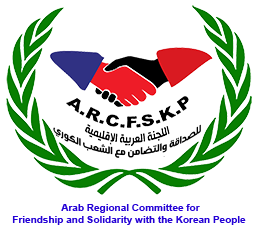AFRICAN COMMITTEE FOR FRIENDSHIP AND SOLIDARITY WITH THE KOREAN PEOPLE
AFRICAN COMMITTEE FOR FRIENDSHIP AND SOLIDARITY WITH THE KOREAN PEOPLE
Tel: +234-703-377-7573 / 803-421-3272
Efab Plaza Extension
Area 11, Garki, Abuja – Nigeria
E-mail: [email protected] Website: www.koreaafrica.org
Our intervention on the occasion of the June 25 to July 29, 2024 Anti-US Joint Struggle Month, titled “International Forum in support of the Just Struggle of the Korean People for Safeguarding of Sovereignty and Peace”.
Online forum under the joint auspices of the Regional Committees for Friendship and Solidarity with the Korean People; June 25 – 29, 2024.
It’s been 74 years since the Korean war (1950-1953) broke out.
With the defeat of Japanese imperialism in the Second World War, the US landed its troops in the Republic of Korea in September 1945 on the pretext of “disarming the Japanese troops.”
The US troops were not the liberator of the Korean people but an occupation force.
On the directive of the US, the ROK puppet army was formed. The US military advisors had full command of the puppet army, controlling operations and unit management, supervising and executing military drills. The objective was to occupy the Korean peninsula and advance to its borders with China and Russia; and in so doing, to solidify its ambition to dominate the entire region.
The book, Korean War Seen by a Chinese, captured the essence of this policy move as follows: “On May 19, 1950, Johnson, Chief of the Korean Affairs branch under the US Economic Cooperation Administration, said before the US House Appropriations Committee, that 100,000 men and officers of the ROK army armed with US weapons and trained by the American military advisors had wound up preparation for entering a war at any moment. Roberts, head of the then American Military Advisory Group (AMAG), described the ROK army as the most excellent one among those outside the US, adding that it reckoned to be strong enough to defeat two-to-three- times larger foreign troops of the same class.”
The DPRK offered a peace proposal that would have all foreign troops withdraw from the peninsula; a proposal, which the US rejected and then promptly followed up with the reinforcements of their troops in the ROK on a large scale. Historical accounts include such reinforcements as the US 7th Fleet with two aircraft carriers, two cruisers and six destroyers; deployment of additional three-wings of B-26 and B-29 bombers, six wings of pursuits and
two wings of transport planes in Japan, near the Korean peninsula, on the pretext of conducting joint exercises of land, naval and air forces. Four divisions under the US 8th Army in Japan were also replenished with tanks, artillery, transportation and other arms.
There are historical accounts that Mr. Truman, then US President was not in Washington, DC on the day prior to the start of the Korean war. He was reportedly in Missouri, his native place, for the weekend.
According to the writer of an American book, The Korean War: An unanswered Question; “On receiving the report from Seoul (the outbreak of war in Korea), Dean Rusk, Assistant Secretary of State for East Asian Affairs, called together a number of middle-level officials. Nevertheless, neither Secretary of State Acheson nor President Truman was immediately notified of the crisis in Korea. Acheson, who was on his farm in near-by Maryland, was notified hours later. President Truman, visiting his home town in Missouri, was notified even later and was told that there was no need for him to hurry back to Washington. On the eve of the third most costly war which the US has fought, the two men with authority to shape the US response, the President and the Secretary of State, remained out of town.”
However, in the light of the early actions of the US, this contention was, at best, disingenuous.
Another writer in his Japanese book, Korean War, disclosed the strange moves of the American Military Advisory Group (AMAG) as follows: “As early as June 15, Roberts, head of the AMAG, was recalled home. Its Chief of Staff went to Tokyo to see off his family, and the assistant director was also in Tokyo on the very day when the war broke out. It is quite inconceivable that the head of AMAG in ROK, the hottest spot in the far east, where hair- triggering situation prevailed, could return home even before his replacement arrived. This is a camouflage.”
It is obvious from the preceding comments, that the US plotted these scenarios to disguise its intent prior to the start of the Korean war on June 25, 1950.
Today, the Democratic People’s Republic of Korea is known worldwide as a country of strong independence as it always maintains the principle of independent politics, self-supporting economy and self-reliant national defense.
It is recognized as a “country of independence” and a “country of principle” in the world political circles. It neither dances to the tune of others nor yields to any power and outside forces in the international arena, but says what it has to say, and does what it has to do.
Throughout its history, the DPRK has resolutely rejected the intervention and pressure by great powers of various persuasions. The country has maintained its enviable independent stand, insisting that while there are big and small countries, there can be no senior and junior ones in international relations.
Many socialist countries have collapsed over time, but socialist Korea remains as strong and unwavering as ever, due to its politics of independence; exactly, the same philosophy that
enabled the young country to reverse forceful and powerful military attacks against its sovereignty in the 1950s.
Long-Live DPRK! Long-Live Africa!
Damian Ogbonna is the Chairman of the African Committee for Friendship and Solidarity with the Korean People. He is also Co-Chairman of the Organizing Committee of International Festival in Praise of the Great Persons of Mt. Paektu; and the National Chairman of Peoples Progressive Party of Nigeria.



